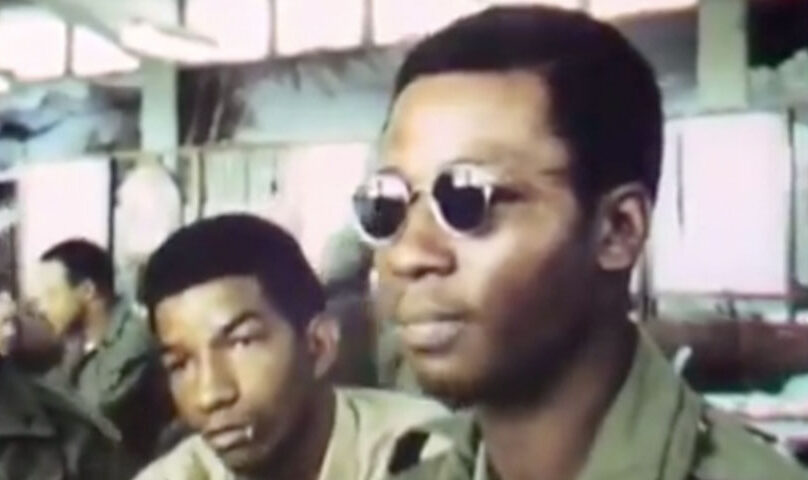The smooth cadence of Mississippi-born-Chicago-raised Sylvester Bracey’s voice, thought to be lost to history, was once again heard—this time thanks to social media.
Almost 50 years ago, Bracey, who enlisted in the Marine Corps at the age of 18 in 1967, agreed to be interviewed for a 1970 television documentary “The Black G.I.,” to discuss his experience with racism within the Marine Corps.
The clip was originally posted by history enthusiast Oluwanisola “Sola” Olosunde, a current Urban Planning graduate at Hunter College who, in his spare time, unearths and posts archival photographs and video footage on Twitter. The 2:20 minute interview snippet, which has now garnered almost six million views on Twitter, just happened to be spotted by Bracey’s grandson, Sylvester Bracey III, as he was scrolling through the app.
“I grew up with my grandfather and to be able to see visual confirmation and hear him in his prime, talking about the same things that he was kicking in the 60s, was really powerful,” Bracey III told NBC News. “For as long as he was alive, he was always planning like: ‘How can we as Black people get free? How can we create community? How can we work together to build something that works for us?’ ”
In the interview Bracey, the central figure of the clip, can be seen surrounded by a group of Black Marines as they air to the cameras the injustices they face.
“We come over here, they get a Vietnamese girl,” Bracey can be seen saying. “She call me a n*gger…. A Vietnamese girl. I know that’s not part of their language. Can’t nobody tell me that’s a part of their language.”
Camp Hanzen, Okinawa, Japan (1970). Black Marines speak on their experiences touring in Asia during the Vietnam War, facing the same discrimination they do back home both on and off base. Rules were established to keep Black men from doing things like sporting afros and dashikis. pic.twitter.com/a6oQaUnENG
— SOLAECLIPSE®️ (@DrinkSolaPop) May 20, 2020
Bracey and the other Marines continue to share their grievances, from hairstyle regulations—“They said an afro was legal…but they want us to wear a high and tight. It’s not my culture”—to what they were ultimately fighting for.
“We go over here, we fight, we fight to defend the water we drink, the land we grow our food on and our way of culture,” says Bracey. “We also fight to protect Rockefeller’s foundations…for all of these foundations that the Black man cannot partake.”
Bracey served two tours in Vietnam before returning home where he worked as an electrician, a crane operator, and had a stint with the U.S. Post Office. The Marine experienced liver and kidney issues for much of his life, which his doctors linked to his exposure to Agent Orange. Bracey passed away in December 2019 from heart disease without ever seeing the documentary.
However, according to his family, until the day he died Bracey was a strong advocate of the civil rights movement. “He was a huge advocate for ‘Black Power,’ believing that Black people should have our own, own our businesses and support our communities,” Angella Allen, Bracey’s ex-wife, told NBC News. “He believed that revolution might be the only answer to equal rights for Blacks. He was a dreamer. He dreamed big for Black people. His biggest desire was to create a spark in others, to ignite their own creations and to use their talents to create a legacy to be passed on and remembered.”
The Vietnam War, divisive within American society, was particularly so for Black Americans. Discriminatory draft practices and treatment against Black troops caused men such as Muhammad Ali and Martin Luther King Jr. to speak out against the war.
The clip, which has since gone viral, speaks to such criticisms.
“In ‘Nam or in the Marines, it was a microcosm of the United States, the same injustices and the same inadequacies,” Sylvester Bracey Jr. told ABC News. “There are so many nuggets, so much to glean from that. I’m just proud that was my father.”





